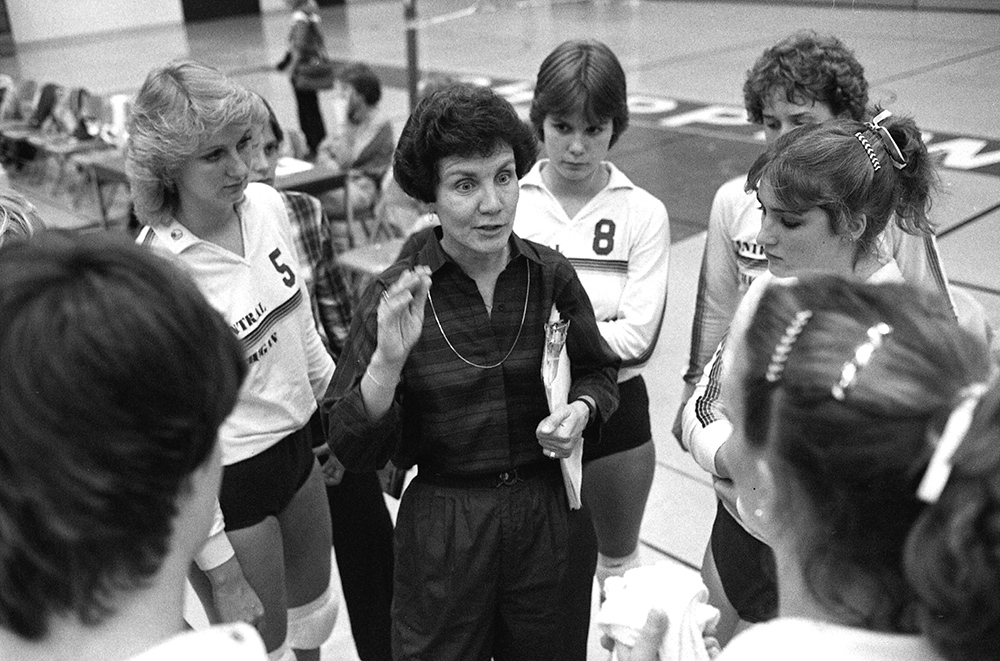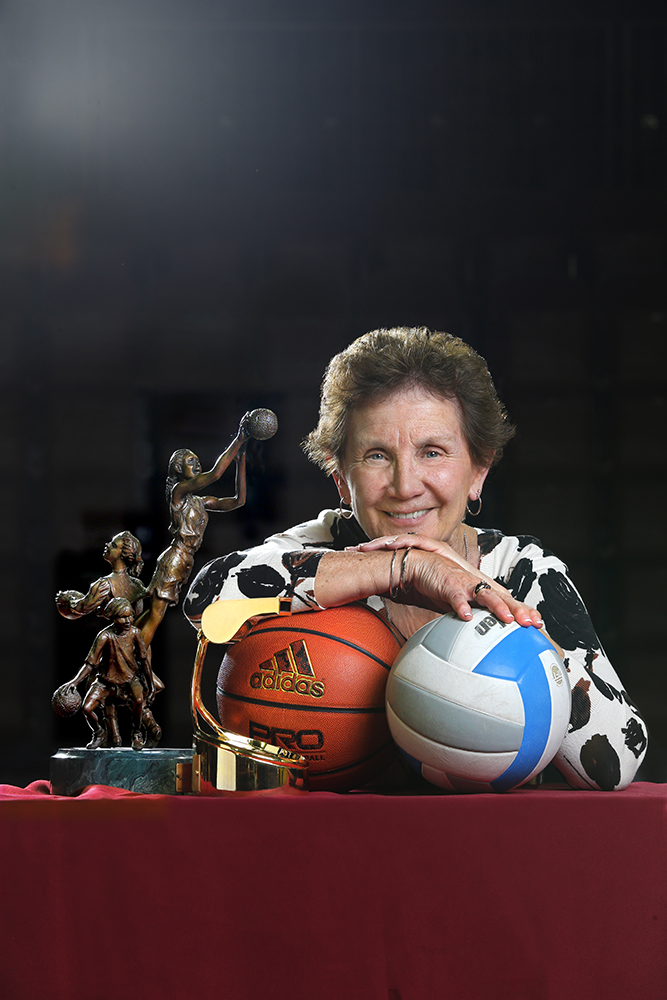Officiating: Marcy Weston's Story
Title IX reshaped college athletics not only for the female athletes and coaches, but also for officials across sports. While at CMU, Marcy Weston filled the shoes of coach, revered official, and trailblazer. Not only did she coach women's field hockey, basketball, and volleyball at CMU, but she also officiated athletic events across the country, served as an administrator within the NCAA's rules-making operations, and helped pave the way for successful women officials.
 |
| Marcy Weston coaching CMU volleyball, 1982 |
Arriving at CMU in 1972—the same year Title IX was enacted—Weston coached field hockey and then volleyball, both fall sports, which allowed her to officiate basketball in the winter (except for a couple seasons, 1974-76, when Weston was CMU's basketball coach). In 1982, when the NCAA first hosted a championship in women's basketball, Marcy Weston was selected as a member of the officiating team for that game—an experience she cites as a highlight of her officiating career. She also officiated the women's NCAA championship game in 1984.
In 1984, Weston moved out of her officiating role and took on two administrative positions in collegiate officiating. She accepted a position as the supervisor of Big Ten officials for the women's game the same year. When hired, she was told by the Commissioner of the Big Ten, Wayne Duke, "Here’s my goal: No one ever calls my office and complains about officiating—you can work for me the rest of your life." Four years after starting her job with the Big Ten, presumably without any calls to the Commissioner's officer, Weston stepped down to handle training of officials for the NCAA.
In addition to starting work for the Big Ten in 1984, Weston also took on the role of secretary-rules editor for women's basketball, meaning she was tasked with writing the rules book with members of the rules committee. As a rules editor, she served on a committee alongside other NCAA officials and collaborated with the men's basketball rules committee to make decisions on policies and regulations in basketball.
She described the resistance she faced initially as a woman in a predominantly male space, saying, "They just shake our hand, don’t even look at us, shake our hand, shake our hand." Despite some of the men's coaches' initial hesitance, Weston managed to win the respect of men and women across the NCAA, helping to shape how the game is played.
 |
| Marcy Weston, 2015 |
Weston's officiating, even as it took on a national stage and crucial role in NCAA athletics, remained a side gig to her CMU career. For years, she fit her CMU duties and officiating together by working every day except Christmas, from the beginning of basketball season through the championship game—refereeing on weekends and during breaks, even refereeing on Thanksgiving Day.
In explaining her time management to juggle these multiple roles, Weston said, "...I was coaching volleyball. ... I was a referee in basketball. Plus, I had my real job. I'm teaching classes, I'm doing a million things. ... I would ref a Big Ten game on a Friday night, be recruiting volleyball on Saturday, and ref a Big Ten game on Sunday. ... So, it was just master manipulation of my schedule ... if I got home at 1:00 in the morning, I was in at 8:15 [am]."
Weston received a number of awards for her impact on college basketball and women's athletics. In 1991, the NCAA awarded Weston with the 10th Anniversary Honorees Award as "one of 10 women who made an impact on NCAA Division I women's basketball in the 1980s." She received this honor alongside other legends in women's basketball, including Pat Summit, a women's basketball coach with the most winning record in collegiate basketball history at the time of her retirement, and Anne Donovan, a two-time Olympian gold medalist. This award was soon followed up by the Jostens-Berenson Service Award in 1994. In 2008, Weston won the Gold Whistle for National Association of Sports Officials as an individual. She was the first woman to ever do so.
In remembering her work and trailblazing at both CMU and across the country, Weston also recalled the words of her mentor, Fran Koenig, who had a background in officiating, as well: "If you're not in the room, you're not part of the conversation.” Weston filled the crucial role of being in the room during a time in which officiating was dominated by men—and she made sure that her voice was heard.
